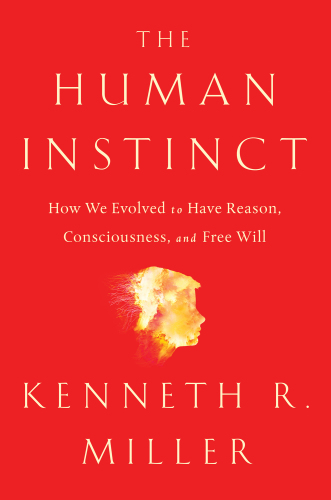
The Human Instinct
How We Evolved to Have Reason, Consciousness, and Free Will
فرمت کتاب
ebook
تاریخ انتشار
2018
نویسنده
Kenneth R. Millerناشر
Simon & Schusterشابک
9781476790282
کتاب های مرتبط
- اطلاعات
- نقد و بررسی
- دیدگاه کاربران
نقد و بررسی

Starred review from January 8, 2018
Miller (Only a Theory), professor of biology at Brown University, confronts both lay and professional misconceptions about evolution from both scientific and philosophical perspectives. He begins his fascinating work with a brief but cogent summary of the basics of human evolution, focusing on current data detailing highlights in the fossil record, genomic patterns attesting to the similarities found across a wide array of species, and the chromosomal relationships between humans and other primates. The conclusion he draws is clear and firm: “The intellectual burden of denying human evolution in the face of so many lines of evidence would be far too great for any fair-minded person to sustain.” Miller builds on this perspective as he addresses three controversial topics: evolutionary psychology, the nature and evolution of consciousness, and the existence of free will. He finds a middle ground between those who believe that evolution should explain every individual behavior and those who criticize evolution for not providing ready-made answers to vexing problems. Miller succeeds in his aims to correct misconceptions while showing that, instead of fostering a sense of pointlessness, learning about human evolution can produce a sense of “joy that we are approaching a genuine understanding of the world in which we live.” Agent: Barney Karpfinger, Karpfinger Agency.

February 15, 2018
An insightful defense of evolution that turns the arguments of creationists against them.As Miller (Biology/Brown Univ.; Only a Theory: Evolution and the Battle for America's Soul, 2008, etc.), notes, when people are polled on whether they believe in evolution, the majority are agreeable; only when asked if humans evolved does the bottom drop out. Most religions, writes the author, "agree on one thing, which is the uniqueness of the human species and the need for a special story to explain how we came to be....By telling us that we do not have such a story, by placing our origins squarely in the ordinary genetic, environmental, and selective processes that have produced every other living thing, evolution sweeps such narratives away and leaves us searching for our birthright as thoughtful, intelligent, and hopeful creatures." Miller disagrees with scientists who proclaim that humans are nothing special, that we are merely the product of natural laws in an indifferent universe. He also disagrees with those who claim that natural selection must be wrong because phenomena such as free will, consciousness, and culture don't increase reproductive fitness. They are not only mistaken, writes the author, but killjoys. His universe is a kaleidoscope of dazzling evolutionary possibilities that our existence illustrates. We are "creatures like no others, with extraordinary flexibility of behavior, powers of imagination, and, above all, conscious self-awareness. That self-awareness has enabled us, alone among living things, to stand above the imperatives of survival and reproduction and seek to understand how we came to be." Human culture, consciousness, and life itself are simply emergent properties. Our appearance was unpredictable but not random, and all organisms fill an evolutionary niche. We may be the first to fill ours, but it was there all the time.Evolutionary biology, neuroscience, and polemic combine in an appealing argument for human uniqueness.
COPYRIGHT(2018) Kirkus Reviews, ALL RIGHTS RESERVED.

April 15, 2018
Free will or determinism? Evolution or creationism? What makes us think the way we do? Is it DNA or a thought process? Miller (biology, Brown Univ.; Only a Theory) here discusses these questions and more through science and philosophy, without getting bogged down by either subject. He discusses DNA and René Descartes, Charles Darwin and Stephen Jay Gould in a way that makes readers feel as if they are having a personal conversation, using Miller's own research supported by scientists and philosophers throughout time. The author asks questions relating to how the human mind developed, what separates humans from other primates, what shapes who we are as a species, and what difference a few chromosomes makes. Readers will discover answers in this book. VERDICT Miller's latest work seamlessly crosses between science and philosophy, appealing to readers of both subjects. Those interested in the human condition or wishing to delve into an introspective text on the self and mind will appreciate the depth and thought.--Dawn Lowe-Wincentsen, Oregon Inst. of Technology, Portland
Copyright 2018 Library Journal, LLC Used with permission.

























دیدگاه کاربران